2021届高考二轮复习英语句法增分精练:06 简单句之疑问句 Word版含解析
文档属性
| 名称 | 2021届高考二轮复习英语句法增分精练:06 简单句之疑问句 Word版含解析 |
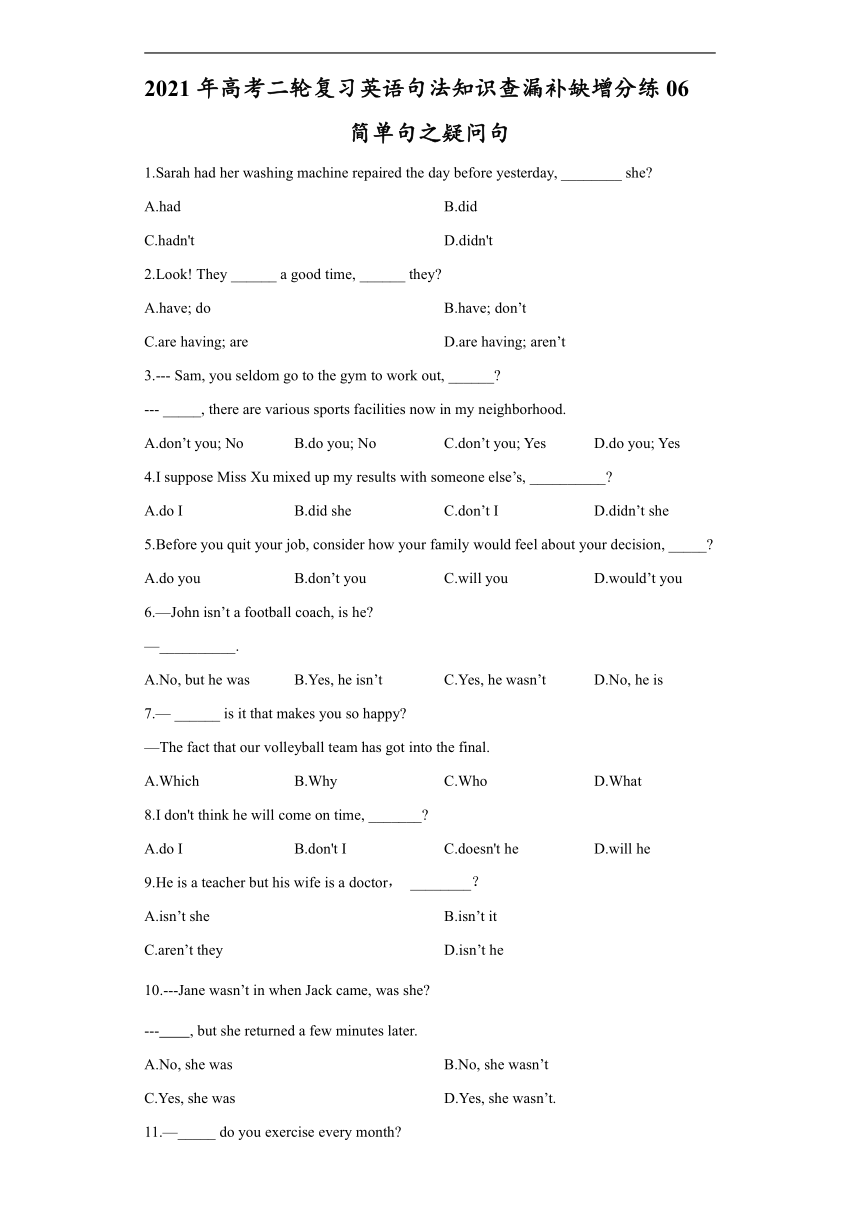
|
|
| 格式 | docx | ||
| 文件大小 | 35.7KB | ||
| 资源类型 | 教案 | ||
| 版本资源 | 通用版 | ||
| 科目 | 英语 | ||
| 更新时间 | 2021-01-23 00:08:51 | ||
图片预览

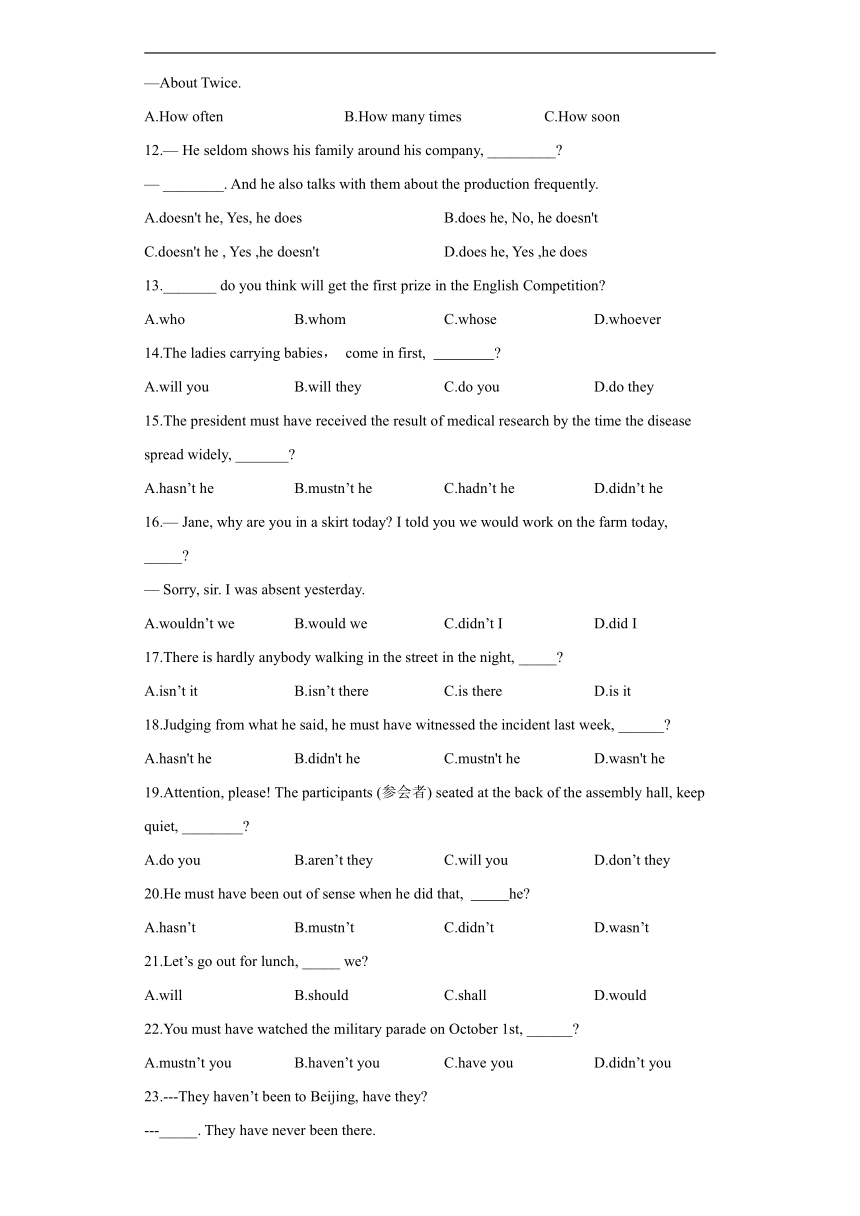
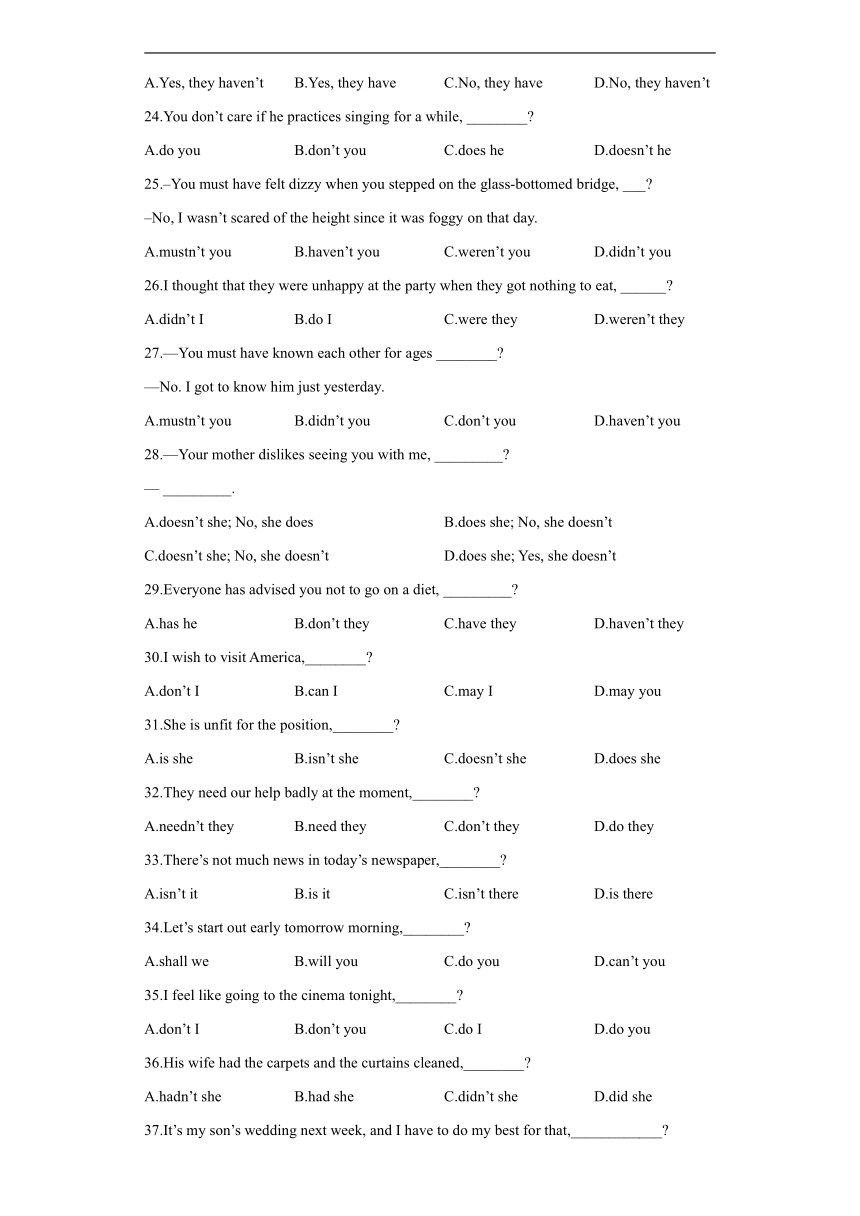
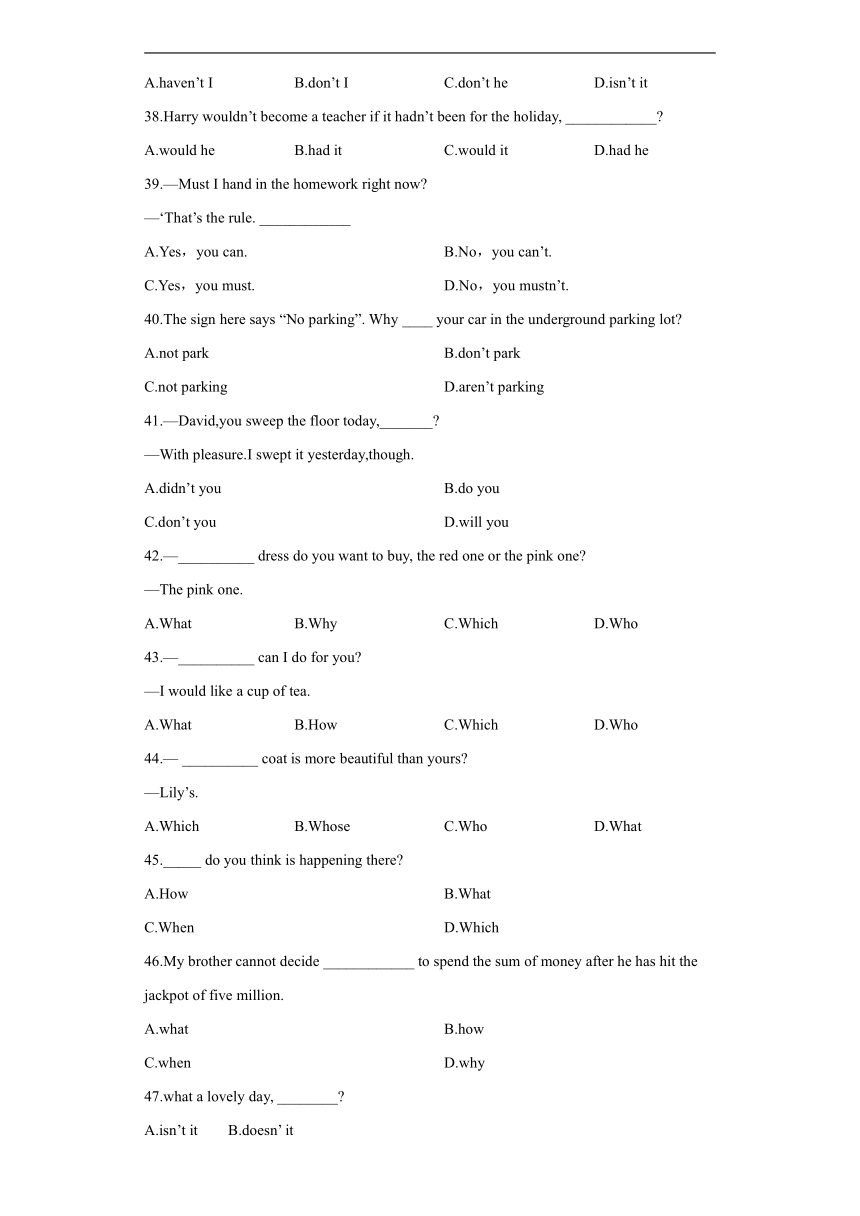
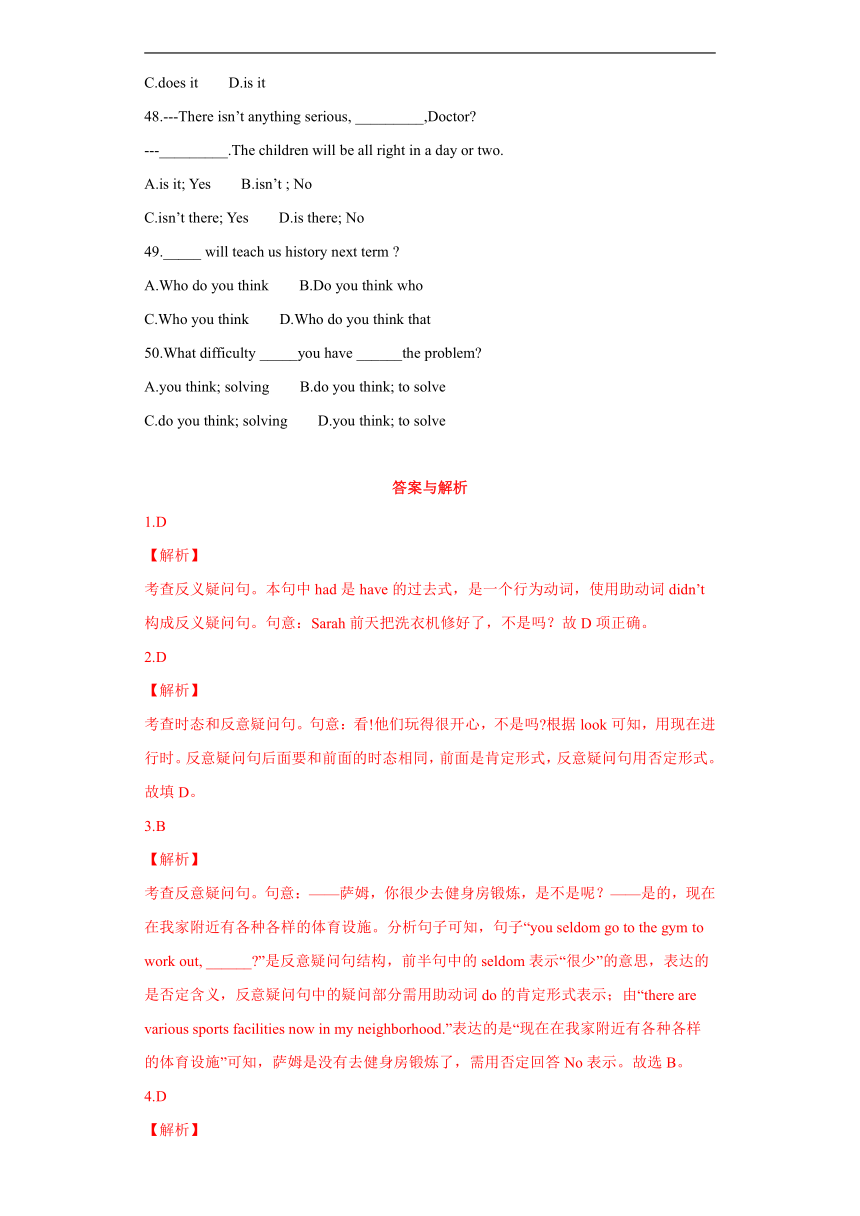
文档简介
2021年高考二轮复习英语句法知识查漏补缺增分练06
简单句之疑问句
1.Sarah had her washing machine repaired the day before yesterday, ________ she?
A.had B.did
C.hadn't D.didn't
2.Look! They ______ a good time, ______ they?
A.have; do B.have; don’t
C.are having; are D.are having; aren’t
3.--- Sam, you seldom go to the gym to work out, ______?
--- _____, there are various sports facilities now in my neighborhood.
A.don’t you; No B.do you; No C.don’t you; Yes D.do you; Yes
4.I suppose Miss Xu mixed up my results with someone else’s, __________?
A.do I B.did she C.don’t I D.didn’t she
5.Before you quit your job, consider how your family would feel about your decision, _____?
A.do you B.don’t you C.will you D.would’t you
6.—John isn’t a football coach, is he?
—__________.
A.No, but he was B.Yes, he isn’t C.Yes, he wasn’t D.No, he is
7.— ______ is it that makes you so happy?
—The fact that our volleyball team has got into the final.
A.Which B.Why C.Who D.What
8.I don't think he will come on time, _______?
A.do I B.don't I C.doesn't he D.will he
9.He is a teacher but his wife is a doctor, ________?
A.isn’t she B.isn’t it
C.aren’t they D.isn’t he
10.---Jane wasn’t in when Jack came, was she?
--- , but she returned a few minutes later.
A.No, she was B.No, she wasn’t
C.Yes, she was D.Yes, she wasn’t.
11.—_____ do you exercise every month?
—About Twice.
A.How often B.How many times C.How soon
12.— He seldom shows his family around his company, _________?
— ________. And he also talks with them about the production frequently.
A.doesn't he, Yes, he does B.does he, No, he doesn't
C.doesn't he , Yes ,he doesn't D.does he, Yes ,he does
13._______ do you think will get the first prize in the English Competition?
A.who B.whom C.whose D.whoever
14.The ladies carrying babies, come in first, ?
A.will you B.will they C.do you D.do they
15.The president must have received the result of medical research by the time the disease spread widely, _______?
A.hasn’t he B.mustn’t he C.hadn’t he D.didn’t he
16.— Jane, why are you in a skirt today? I told you we would work on the farm today, _____?
— Sorry, sir. I was absent yesterday.
A.wouldn’t we B.would we C.didn’t I D.did I
17.There is hardly anybody walking in the street in the night, _____?
A.isn’t it B.isn’t there C.is there D.is it
18.Judging from what he said, he must have witnessed the incident last week, ______?
A.hasn't he B.didn't he C.mustn't he D.wasn't he
19.Attention, please! The participants (参会者) seated at the back of the assembly hall, keep quiet, ________?
A.do you B.aren’t they C.will you D.don’t they
20.He must have been out of sense when he did that, he?
A.hasn’t B.mustn’t C.didn’t D.wasn’t
21.Let’s go out for lunch, _____ we?
A.will B.should C.shall D.would
22.You must have watched the military parade on October 1st, ______?
A.mustn’t you B.haven’t you C.have you D.didn’t you
23.---They haven’t been to Beijing, have they?
---_____. They have never been there.
A.Yes, they haven’t B.Yes, they have C.No, they have D.No, they haven’t
24.You don’t care if he practices singing for a while, ________?
A.do you B.don’t you C.does he D.doesn’t he
25.–You must have felt dizzy when you stepped on the glass-bottomed bridge, ___?
–No, I wasn’t scared of the height since it was foggy on that day.
A.mustn’t you B.haven’t you C.weren’t you D.didn’t you
26.I thought that they were unhappy at the party when they got nothing to eat, ______?
A.didn’t I B.do I C.were they D.weren’t they
27.—You must have known each other for ages ________?
—No. I got to know him just yesterday.
A.mustn’t you B.didn’t you C.don’t you D.haven’t you
28.—Your mother dislikes seeing you with me, _________?
— _________.
A.doesn’t she; No, she does B.does she; No, she doesn’t
C.doesn’t she; No, she doesn’t D.does she; Yes, she doesn’t
29.Everyone has advised you not to go on a diet, _________?
A.has he B.don’t they C.have they D.haven’t they
30.I wish to visit America,________?
A.don’t I B.can I C.may I D.may you
31.She is unfit for the position,________?
A.is she B.isn’t she C.doesn’t she D.does she
32.They need our help badly at the moment,________?
A.needn’t they B.need they C.don’t they D.do they
33.There’s not much news in today’s newspaper,________?
A.isn’t it B.is it C.isn’t there D.is there
34.Let’s start out early tomorrow morning,________?
A.shall we B.will you C.do you D.can’t you
35.I feel like going to the cinema tonight,________?
A.don’t I B.don’t you C.do I D.do you
36.His wife had the carpets and the curtains cleaned,________?
A.hadn’t she B.had she C.didn’t she D.did she
37.It’s my son’s wedding next week, and I have to do my best for that,____________?
A.haven’t I B.don’t I C.don’t he D.isn’t it
38.Harry wouldn’t become a teacher if it hadn’t been for the holiday, ____________?
A.would he B.had it C.would it D.had he
39.—Must I hand in the homework right now?
—‘That’s the rule. ____________
A.Yes,you can. B.No,you can’t.
C.Yes,you must. D.No,you mustn’t.
40.The sign here says “No parking”. Why ____ your car in the underground parking lot?
A.not park B.don’t park
C.not parking D.aren’t parking
41.—David,you sweep the floor today,_______?
—With pleasure.I swept it yesterday,though.
A.didn’t you B.do you
C.don’t you D.will you
42.—__________ dress do you want to buy, the red one or the pink one?
—The pink one.
A.What B.Why C.Which D.Who
43.—__________ can I do for you?
—I would like a cup of tea.
A.What B.How C.Which D.Who
44.— __________ coat is more beautiful than yours?
—Lily’s.
A.Which B.Whose C.Who D.What
45._____ do you think is happening there?
A.How B.What
C.When D.Which
46.My brother cannot decide ____________ to spend the sum of money after he has hit the jackpot of five million.
A.what B.how
C.when D.why
47.what a lovely day, ________?
A.isn’t it B.doesn’ it
C.does it D.is it
48.---There isn’t anything serious, _________,Doctor?
---_________.The children will be all right in a day or two.
A.is it; Yes B.isn’t ; No
C.isn’t there; Yes D.is there; No
49._____ will teach us history next term ?
A.Who do you think B.Do you think who
C.Who you think D.Who do you think that
50.What difficulty _____you have ______the problem?
A.you think; solving B.do you think; to solve
C.do you think; solving D.you think; to solve
答案与解析
1.D
【解析】
考查反义疑问句。本句中had是have的过去式,是一个行为动词,使用助动词didn’t构成反义疑问句。句意:Sarah前天把洗衣机修好了,不是吗?故D项正确。
2.D
【解析】
考查时态和反意疑问句。句意:看!他们玩得很开心,不是吗?根据look可知,用现在进行时。反意疑问句后面要和前面的时态相同,前面是肯定形式,反意疑问句用否定形式。故填D。
3.B
【解析】
考查反意疑问句。句意:——萨姆,你很少去健身房锻炼,是不是呢?——是的,现在在我家附近有各种各样的体育设施。分析句子可知,句子“you seldom go to the gym to work out, ______?”是反意疑问句结构,前半句中的seldom表示“很少”的意思,表达的是否定含义,反意疑问句中的疑问部分需用助动词do的肯定形式表示;由“there are various sports facilities now in my neighborhood.”表达的是“现在在我家附近有各种各样的体育设施”可知,萨姆是没有去健身房锻炼了,需用否定回答No表示。故选B。
4.D
【解析】
考查反意疑问句。句意:我想许老师把我的成绩和别人的混淆了,不是吗? 若反意疑问句的陈述部分为I (we) think (believe, suppose, consider) + that从句时,问句部分的助动词和主语与that从句内的动词和主语保持一致。前为肯定形式,所以反意疑问句为否定形式。故选D。
5.C
【解析】
考查反意问句。句意:在你辞去工作之前,考虑一下你的家人将会是怎样的感受,好吗?这里考查的是反意问句结构。反意疑问句反主句,主句是祈使句的肯定部分,祈使句的反意疑问句为will you。故选C选项。
6.A
【解析】
考查反意疑问句。句意:——约翰不是足球教练,是吗?——不是,但他以前是。反意疑问句的回答根据实际情况回答,“是”就回答yes,“不是”就回答no 。根据句意可知,John现在不是,但他以前是足球教练,即No, but he was。故选A项。
7.D
【解析】
考查疑问词。句意:——是什么让你这么开心?——我们排球队进入决赛的事实(让我这么开心)。问句是一个强调句,去掉is it that后,句子结构完整,语义清晰,空格所填的内容在句中作主语,提问的是答语中的the fact,指事情,所以只能选what。故选D项。
8.D
【解析】
考查反意疑问句。句意:我认为他不会准时来,是吗? 在反意疑问句,陈述部分否定式 + 疑问部分肯定式,排除B和C;主句谓语是think, believe, expect, suppose, imagine等引导的宾语从句,疑问部分与宾语从句相对应构成反意疑问句。故选D。
9.A
【解析】
考查反意疑问句。句意:他是教师,但他的妻子是医生 ,是吗?反义疑问句一般遵循“前肯后否,前否后肯”的原则, 当陈述部分是并列句,反义疑问句则需和就近的分句的主语和谓语一致,本句中就近的分句是”his wife is a doctor”,所以后面应该是isn’t she,故选A。
10.B
【解析】
考查反意疑问句。句意:—杰克回来的时候简不在家,是吗?—是的,她不在,但是她几分钟之后回来了。回答反意疑问句时,不管问题是何种提法,若事实是肯定的,用yes回答;若事实是否定的,就用no来回答。后文转折说简回来了,所以这里是她不在了,事实是否定,所以要选she wasn't,和No搭配。故选B项。
11.B
【解析】
考查特殊疑问句。句意:——你每个月锻炼几次?——大约两次。A. How often 多长时间一次;B. How many times多少次;C. How soon多久之后。根据“About Twice.”,可知,此处是问“多少次”,故选B。
12.D
【解析】
考查反意疑问句。句意:—他很少带他的家人参观公司,对吗?—不,他常带。他还常常和家人谈论产品的情况。第一空是反意疑问句,前面有否定副词seldom,是否定句,后面反意问句用肯定的形式,根据前面的人称和一般现在时的时态,相对应的助动词为does,因此是does he;第二空:反意疑问句的回答需根据时间情况从后往前翻译。根据后面的语境“他还常常和家人谈论产品的情况”可知,实际情况是他常带家人参观工厂,是肯定的意思,因此是he does,前面相应地用yes,翻译为“不,他经常(带他的家人参观公司)”。故选D项。
13.A
【解析】
考查复杂疑问句。句意:你认为谁会在英语竞赛中获得一等奖。这是一个复杂疑问句,其中do you think是插入语,who是句子主语。构成“疑问词+插入语+陈述句”结构。故选A。
14.A
【解析】
考查祈使句的反意疑问句。句意:抱着孩子的女士先进来,好吗? 解题步骤:1.确定句型:The ladies carrying babies是对这个女人的称呼语,根据come in first可知,此处是祈使句;2.确定答案:若陈述部分为祈使句,反意疑问句通常用will you, won’t you, would you等。故选A。
15.C
【解析】
考查反意疑问句。句意:当疾病广泛传播时,总统一定已经收到了医学研究的结果,不是吗?当情态动词can/may/should/must等在句中表推测语气时,反意疑问部分应根据实义动词的实际发生时间来构成;此处动词receive发生在从句谓语动词spread之前,表示“过去的过去”(过去完成时had done),所以反意疑问部分用hadn’t he。故选C项。
16.C
【解析】
考查反意疑问句。句意:—简,你今天为什么穿裙子?我说过我们今天会在农场工作,不是吗?—对不起,先生。我昨天缺席了。分析句子可知,本句是对主句进行反问,故用助动词did,而且前面肯定,后面是否定,故选C。
17.C
【解析】
考查反意疑问句。句意:晚上几乎没有人在街上走,是吗?there be句型的反义疑问句主语是there,反义疑问句前面是否定的,反义疑问句用肯定形式,故选C。
18.B
【解析】
考查反意疑问句。句意:从他所说的来看,他一定是目击了上周的那件事,是吗?根据前面的时间状语last week,must have done 表示对过去事实肯定的推测。可知,此处是对过去的反问,陈述部分是肯定,疑问部分用否定。故选B。
19.C
【解析】
考查反意疑问句。句意:请注意!坐在大会堂后面的参会者,保持安静,好吗?本句是一个祈使句keep quiet,这类祈使句一般用will you和won’t you做反意问句。故选C。
20.D
【解析】
考查反意疑问句。句意:他那样做的时候一定是疯了,是吗?must have done表示对过去的肯定推测,且陈述部分为肯定句,故应用wasn’t he?。结合选项,故选D。
21.C
【解析】
情况下,祈使句的反意疑问句的疑问部分是用“will you?”,但在Let’s ...开头的反意疑问句,因为“我们”中包括“说话人”,所以其后面的疑问句部分要用“shall we?”,但Let us...开头的反意疑问句,不包括说话人其附加成分是“will you?”。本句是以Let’s 开头,故选C。
22.D
【解析】
本题考查反义疑问句。句意:你一定看了十月一日的阅兵仪式,是吗?本题考查反义疑问句。反义问句的基本结构是"陈述句+简略疑问句?",疑问句中的主语和助动词与陈述句一致;当陈述句含推测的情态动词时,疑问句中的助动词的判断方法是"去掉表示推测的情态动词,将句子还原";本句还原为"You watched the military parade on October 1st",根据时间October 1st可知是对过去的事情的肯定推测,此时需要用与对应的过去时间所表达的事实一样的反意疑问句形式.所以用didn't you。故选D。
【点睛】
must表示推测时的反义疑问句解题策略:
1、当must用来表示对现在的情况进行推测时,问句通常要根据must后面的动词采用相应的形式。例如:It must be late,isn't it? 天一定黑了,是吗?
2、当must+have done表示对过去的情况进行推测(一般句中有明确的过去时间状语),问句要根据陈述部分谓语的情况用"didn't+主语"或"wasn't/weren't+主语";如果强调动作的完成(一般没有明确的过去时间状语),问句要用"haven't/hasn't+主语"。
例如:1)It is six o'clock. She must have come home,didn't she? 现在是六点,她一定到家了,是吗?
2)You must have told her about it,haven't you?你一定把这事告诉她了,是吗?
23.D
【解析】
考查反意疑问句。句意:——他们没去过北京,是吗?——是的,他们从未去过北京。反意疑问句的答语中,yes后应该是肯定形式,no后是否定形式,故选项A、C是错误的。反意疑问句中前部分是否定形式,根据答语中They have never been there.可知没去过北京,应该是No, they haven’t,故选D。
【点睛】
反意疑问句的回答?
对反意疑问句的回答,无论问题的提法如何,如果事实是肯定的,就用yes,事实是否定的,就要用no。但要特别注意陈述句部分是否定结构,反义疑问句部分用肯定式提问时,回答yes或no与汉语正好相反。这种省略回答的yes要译成“不”,no要译成“是”。
如:——He likes playing football, doesn’t he? 他喜欢踢足球,是吗?
——Yes, he does./No, he doesn’t. 是的。/不是。
——His sister didn’t attend the meeting, did she? 他妹妹没有参加会议,是吗?
——Yes, she did./ No, she didn’t. 不,她参加了。/是的,她没参加。
24.A
【解析】
考查反意疑问句。句意:你不在乎他是否练习唱歌,是吗?反意疑问句遵循前肯后否原则,前一部分用否定形式,后一部分用肯定形式,根据“You don’t”可知此处用do you?故A项正确。
25.D
【解析】
考查反意疑问句。句意:——你踏上这座玻璃桥时一定感到头晕,是吗?——不,我不害怕高度,因为那天有雾。mustn’t表示禁止。陈述部分含有表示推测的must时,反意疑问句的谓语动词通常根据must后的动词的性质来定,如果是be动词,则根据主语选择相应的be动词;如果是实意动词的一般式,则根据主语选择适当的助动词do,does;如果是现在完成时的结构,则通常根据主语选择适当的助动词have或has,但是句中有过去时间的提示要用didn't+主语,此处表示对过去发生情况的反问,故用didn’t you。故选D。
26.D
【解析】
【分析】
考查反意疑问句。句意:我以为他们在聚会上没有东西吃时是不高兴的,不是吗? 反意疑问句的陈述部分为I(We) think(believe, suppose, consider) + that从句时,问句部分的动词及主语与that从句内的动词和主语保持一致。故反意疑问句应与从句they were unhappy at the party when they got nothing to eat保持一致,从句为肯定陈述句,故反意疑问句应用否定。故选D。
27.D
【解析】
考查反义疑问句。句意:——你们一定认识很久了,不是吗?——不。我昨天才认识他。反义疑问句的基本结构是“陈述句+简略疑问句”,疑问句中的主语和助动词与陈述句一致;当陈述句含推测的情态动词时,疑问句中的助动词的判断方法是“去掉表示推测的情态动词,将句子还原”;本句还原为“You have known each other for ages”,故选D。
28.C
【解析】
考查反意疑问句。句意:---你妈妈不喜欢看到你和我在一起,是吗?----不,她没有。若陈述部分含有带否定前缀的词,反意疑问句仍用否定式。回答表示“不,她不讨厌看到你和我在一起”。故选C项。
29.D
【解析】
考查反意疑问句。句意:每个人都劝你不要节食,是吗。分析句子可知,当陈述句的主语为anybody, anyone, everybody, everyone, somebody, someone, nobody, no one时,反意疑问句的主语用they。再分析,本句为现在完成时且为肯定句,所以反意疑问句为haven’t they。故选D项。
【点睛】
反意疑问句用法
1、当陈述句的主语为anybody, anyone, everybody, everyone, somebody, someone, nobody, no one时,反意疑问句的主语用they。但亦可用he,尤其是nobody, no one等作主语,
2、当陈述句的主语为everything, anything, nothing, something等时,反意疑问句的主语用it.
3、当陈述部分的主语是指示代词this, that或these, those时,附加疑问句中的主语分别用it和they。
4、当陈述句的谓语部分含有had better, would rather, would like, ought to时, 反意疑问句的谓语应用相应的助动词。
5、当陈述句的谓语是wish时, 反意疑问句的谓语用may, 而且前后两个部分都用肯定式。E.g.
6、当陈述句的谓语部分含有have to, had to时, 反意疑问句的谓语部分用do的适当形式。
7、当陈述句的谓语部分含有used to时, 反意疑问句的谓语部分有两种表达方式didn’t / usedn’t。
8、感叹句后的附加疑问句的谓语动词需用be的现在时,且常用否定形式。如:
9、当陈述句的主语是第一人称,谓语动词是 think, believe, suppose, fancy, imagine, expect,后接宾语从句时, 反意疑问句应对宾语从句进行提问。
分析句子可知,当陈述句的主语为anybody, anyone, everybody, everyone, somebody, someone, nobody, no one时,反意疑问句的主语用they。再分析,本句为现在完成时且为肯定句,所以反意疑问句为haven’t they。故选D项。
30.C
【解析】
考查反意疑问句。句意:我想去美国,可以吗?在反意疑问句中,当陈述部分的谓语是wish,疑问部分要用may +主语。根据上文I wish to visit America可知,疑问部分应用may I。故选C。
31.B
【解析】
考查反意疑问句。句意:她不适合这个职位,是吗? 当反意疑问句的陈述部分含有由un-, im-, in-, dis-, 等否定意义的前缀构成的词语时,陈述部分要视为肯定含义,问句部分用否定形式。根据上文She is unfit for the position中含有unfit可知疑问部分应用否定形式,时态和人称与主句保持一致。故选B。
32.C
【解析】
考查反意疑问句。句意:他们现在急需我们的帮助,不是吗?本句中need是实义动词,所以反意疑问部分用助动词,人称、时态与上文They need our help badly at the moment保持一致。故选C。
【点睛】
need 既是情态动词,又是实义动词。因此,先判断need是情态动词还是实义动词。当need后接动词原形时,need为情态动词,疑问部分用need或needn't提出疑问;当need是实义动词时,疑问部分用助动词do(don't),does(doesn't),did(didn't)等提出疑问。
33.D
【解析】
考查反意疑问句。句意:今天的报纸上没有多少新闻,是吗? there be句型时,反意疑问句中一般用“be/情态动词/助动词+there”。且陈述部分有not含有否定意义的词汇时,后面的反意疑问句则为肯定形式。故选D。
34.A
【解析】
考查反意疑问句。句意:我们明天一大早就出发,好吗? 以Let's(听者包括在内)开头的祈使句,反意疑问部分必须用shall we(shall只用于第一人称)。故选A。
【点睛】
以Let's(听者包括在内)开头的祈使句,疑问句必须用shall we(shall只用于第一人称);以Let us(听话人不被包括在“us”里面)开头的祈使句,表示请求,反意疑问句用will you;若表示建议,反意疑问句用shall we。如:
Let us know your address, will you? 请把你的地址告诉我们,好吗?
Let us go swimming together, shall we? 我们一起去游泳好吗?
35.D
【解析】
考查一般问句。句意:我今晚想去看电影,你呢?前半句的意思是“我今晚想去看电影”,然后问do you?完整为do you like going to the cinema tonight?的省略,是询问对方意见,问对方是否愿意去。故选D。
36.C
【解析】
考查反意疑问句。句意:他的妻子把地毯和窗帘都打扫了,是吗?根据上文His wife had the carpets and the curtains cleaned为肯定陈述句,故疑问部分应用否定,且时态和人称与主句保持一致,填didn’t she。故选C。
37.B
【解析】
考查反意疑问句。句意:下周是我儿子的婚礼,我得尽我最大的努力,不是吗? 根据上文主句I have to do my best for that为陈述部分有have to 时,其反意疑问句要用助动词的否定形式。故选B。
38.A
【解析】
考查反意疑问句。句意:如果没有假期,哈利不会成为一名教师,是吗?反意疑问句中主语用和主句一致的主语,用主格。故本句疑问部分与Harry wouldn’t become a teacher保持一致。且Harry wouldn’t become a teacher为否定陈述句,故疑问部分为肯定。时态和人称保持一致。故选A。
39.C
【解析】
考查情态动词一般疑问句的回答。句意:——我必须现在交作业吗?——这是规则。是的,你必须。A. Yes,you can.是的,你能;B. No,you can’t.不,你不能;C. Yes,you must.是的,你必须;D. No,you mustn’t.不,你禁止。回答must,肯定句用must,表示“必须”。结合句意可知答案为C。
40.A
【解析】
考查固定用法。句意:此处标志写着“禁止停车”,为什么你不停到地下停车场呢?固定句式why not do“为什么不做某事”后跟动词原形,故选A。
41.D
【解析】
考查反意疑问句。句意:——David,你今天扫地,可以吗?——非常乐意,尽管我昨天扫了。you sweep the floor today动作还没有发生,是祈使句,反问时用将来时反问,故选D。
42.C
【解析】
考查疑问代词。句意:——你想买哪件裙子?红色的还是粉色的?——粉色的。根据后面the red one or the pink one?可知,这里是指在红色和粉色中选出一件,在一定范围内进行选择要用which,故选C。
43.A
【解析】
考查疑问代词。句意:——我能为你做些什么呢?——我想要一杯茶。What can I do for you?这是口语中一句极为常用的句子(也说Can I help you?或May I help you?等),广泛用于商店、饭店、旅馆、邮局、办事处等场所,作为对顾客的招呼语。其本义是:要我帮忙吗? 我可以帮你吗? 我能替你做点什么吗?故选A。
44.B
【解析】
考查疑问代词。句意:——谁的外套比你的更漂亮?——莉莉的。根据回答Lily’s.可知,上一句是问谁的,因此要用whose,故选B。
45.B
【解析】
考查特殊疑问句的引导词。句意:你认为那里发生了什么?分析句子结构,do you think为插入语,happen缺少主语,排除A、C项,连接副词不可作主语;what happens意为“发生了什么?”,是固定搭配,此处用现在进行时表示将来时态。which作主语表示“哪一个”,所以排除D项,只有B项正确。
46.B
【解析】
考查疑问词+动词不定式。句意:我哥哥在中了500万头奖后不能决定如何花这笔钱。不定式作动词decide,know,show等的宾语时,一般需要根据句子表达的意义选用合适的特殊疑问词。常见的特殊疑问词有who,what,which,how,where,when。根据句意可知此处应用how。故选B。
47.A
【解析】
考查反意疑问句。句意:今天天气真好,不是吗?这是一个反意疑问句,前半句是what引导的感叹句,省略了it is,所以后半句应该用否定形式isn’t it。故选A。
48.D
【解析】
考查反义疑问句。句意:没有什么严重的事情吧,是吗?—是的,这个孩子一两天就会好起来的。第一句中是there be句中,构成反义疑问句时,仍然对there进行反问;因原句是否定句,反义疑问句中使用肯定句。所以第一空中使用is there。前句是否定句时,答句中no意为“是的”,yes意为“不”。根据句意可知D项正确。
49.A
【解析】
考查插入语和特殊疑问句。“do you think”通常在句中做插入语,放在句中与特殊疑问词连用构成特殊疑问句。句意:你认为下学期谁会教我们历史。故A项正确。
50.C
【解析】
考查插入语和动词短语。句中do you think是插入语,动词短语have difficulty in doing sth做某事有困难。句意:你认为他解决这个问题有什么困难?AD项语序错误,B项第二空应该使用动名词形式。故C项正确。
简单句之疑问句
1.Sarah had her washing machine repaired the day before yesterday, ________ she?
A.had B.did
C.hadn't D.didn't
2.Look! They ______ a good time, ______ they?
A.have; do B.have; don’t
C.are having; are D.are having; aren’t
3.--- Sam, you seldom go to the gym to work out, ______?
--- _____, there are various sports facilities now in my neighborhood.
A.don’t you; No B.do you; No C.don’t you; Yes D.do you; Yes
4.I suppose Miss Xu mixed up my results with someone else’s, __________?
A.do I B.did she C.don’t I D.didn’t she
5.Before you quit your job, consider how your family would feel about your decision, _____?
A.do you B.don’t you C.will you D.would’t you
6.—John isn’t a football coach, is he?
—__________.
A.No, but he was B.Yes, he isn’t C.Yes, he wasn’t D.No, he is
7.— ______ is it that makes you so happy?
—The fact that our volleyball team has got into the final.
A.Which B.Why C.Who D.What
8.I don't think he will come on time, _______?
A.do I B.don't I C.doesn't he D.will he
9.He is a teacher but his wife is a doctor, ________?
A.isn’t she B.isn’t it
C.aren’t they D.isn’t he
10.---Jane wasn’t in when Jack came, was she?
--- , but she returned a few minutes later.
A.No, she was B.No, she wasn’t
C.Yes, she was D.Yes, she wasn’t.
11.—_____ do you exercise every month?
—About Twice.
A.How often B.How many times C.How soon
12.— He seldom shows his family around his company, _________?
— ________. And he also talks with them about the production frequently.
A.doesn't he, Yes, he does B.does he, No, he doesn't
C.doesn't he , Yes ,he doesn't D.does he, Yes ,he does
13._______ do you think will get the first prize in the English Competition?
A.who B.whom C.whose D.whoever
14.The ladies carrying babies, come in first, ?
A.will you B.will they C.do you D.do they
15.The president must have received the result of medical research by the time the disease spread widely, _______?
A.hasn’t he B.mustn’t he C.hadn’t he D.didn’t he
16.— Jane, why are you in a skirt today? I told you we would work on the farm today, _____?
— Sorry, sir. I was absent yesterday.
A.wouldn’t we B.would we C.didn’t I D.did I
17.There is hardly anybody walking in the street in the night, _____?
A.isn’t it B.isn’t there C.is there D.is it
18.Judging from what he said, he must have witnessed the incident last week, ______?
A.hasn't he B.didn't he C.mustn't he D.wasn't he
19.Attention, please! The participants (参会者) seated at the back of the assembly hall, keep quiet, ________?
A.do you B.aren’t they C.will you D.don’t they
20.He must have been out of sense when he did that, he?
A.hasn’t B.mustn’t C.didn’t D.wasn’t
21.Let’s go out for lunch, _____ we?
A.will B.should C.shall D.would
22.You must have watched the military parade on October 1st, ______?
A.mustn’t you B.haven’t you C.have you D.didn’t you
23.---They haven’t been to Beijing, have they?
---_____. They have never been there.
A.Yes, they haven’t B.Yes, they have C.No, they have D.No, they haven’t
24.You don’t care if he practices singing for a while, ________?
A.do you B.don’t you C.does he D.doesn’t he
25.–You must have felt dizzy when you stepped on the glass-bottomed bridge, ___?
–No, I wasn’t scared of the height since it was foggy on that day.
A.mustn’t you B.haven’t you C.weren’t you D.didn’t you
26.I thought that they were unhappy at the party when they got nothing to eat, ______?
A.didn’t I B.do I C.were they D.weren’t they
27.—You must have known each other for ages ________?
—No. I got to know him just yesterday.
A.mustn’t you B.didn’t you C.don’t you D.haven’t you
28.—Your mother dislikes seeing you with me, _________?
— _________.
A.doesn’t she; No, she does B.does she; No, she doesn’t
C.doesn’t she; No, she doesn’t D.does she; Yes, she doesn’t
29.Everyone has advised you not to go on a diet, _________?
A.has he B.don’t they C.have they D.haven’t they
30.I wish to visit America,________?
A.don’t I B.can I C.may I D.may you
31.She is unfit for the position,________?
A.is she B.isn’t she C.doesn’t she D.does she
32.They need our help badly at the moment,________?
A.needn’t they B.need they C.don’t they D.do they
33.There’s not much news in today’s newspaper,________?
A.isn’t it B.is it C.isn’t there D.is there
34.Let’s start out early tomorrow morning,________?
A.shall we B.will you C.do you D.can’t you
35.I feel like going to the cinema tonight,________?
A.don’t I B.don’t you C.do I D.do you
36.His wife had the carpets and the curtains cleaned,________?
A.hadn’t she B.had she C.didn’t she D.did she
37.It’s my son’s wedding next week, and I have to do my best for that,____________?
A.haven’t I B.don’t I C.don’t he D.isn’t it
38.Harry wouldn’t become a teacher if it hadn’t been for the holiday, ____________?
A.would he B.had it C.would it D.had he
39.—Must I hand in the homework right now?
—‘That’s the rule. ____________
A.Yes,you can. B.No,you can’t.
C.Yes,you must. D.No,you mustn’t.
40.The sign here says “No parking”. Why ____ your car in the underground parking lot?
A.not park B.don’t park
C.not parking D.aren’t parking
41.—David,you sweep the floor today,_______?
—With pleasure.I swept it yesterday,though.
A.didn’t you B.do you
C.don’t you D.will you
42.—__________ dress do you want to buy, the red one or the pink one?
—The pink one.
A.What B.Why C.Which D.Who
43.—__________ can I do for you?
—I would like a cup of tea.
A.What B.How C.Which D.Who
44.— __________ coat is more beautiful than yours?
—Lily’s.
A.Which B.Whose C.Who D.What
45._____ do you think is happening there?
A.How B.What
C.When D.Which
46.My brother cannot decide ____________ to spend the sum of money after he has hit the jackpot of five million.
A.what B.how
C.when D.why
47.what a lovely day, ________?
A.isn’t it B.doesn’ it
C.does it D.is it
48.---There isn’t anything serious, _________,Doctor?
---_________.The children will be all right in a day or two.
A.is it; Yes B.isn’t ; No
C.isn’t there; Yes D.is there; No
49._____ will teach us history next term ?
A.Who do you think B.Do you think who
C.Who you think D.Who do you think that
50.What difficulty _____you have ______the problem?
A.you think; solving B.do you think; to solve
C.do you think; solving D.you think; to solve
答案与解析
1.D
【解析】
考查反义疑问句。本句中had是have的过去式,是一个行为动词,使用助动词didn’t构成反义疑问句。句意:Sarah前天把洗衣机修好了,不是吗?故D项正确。
2.D
【解析】
考查时态和反意疑问句。句意:看!他们玩得很开心,不是吗?根据look可知,用现在进行时。反意疑问句后面要和前面的时态相同,前面是肯定形式,反意疑问句用否定形式。故填D。
3.B
【解析】
考查反意疑问句。句意:——萨姆,你很少去健身房锻炼,是不是呢?——是的,现在在我家附近有各种各样的体育设施。分析句子可知,句子“you seldom go to the gym to work out, ______?”是反意疑问句结构,前半句中的seldom表示“很少”的意思,表达的是否定含义,反意疑问句中的疑问部分需用助动词do的肯定形式表示;由“there are various sports facilities now in my neighborhood.”表达的是“现在在我家附近有各种各样的体育设施”可知,萨姆是没有去健身房锻炼了,需用否定回答No表示。故选B。
4.D
【解析】
考查反意疑问句。句意:我想许老师把我的成绩和别人的混淆了,不是吗? 若反意疑问句的陈述部分为I (we) think (believe, suppose, consider) + that从句时,问句部分的助动词和主语与that从句内的动词和主语保持一致。前为肯定形式,所以反意疑问句为否定形式。故选D。
5.C
【解析】
考查反意问句。句意:在你辞去工作之前,考虑一下你的家人将会是怎样的感受,好吗?这里考查的是反意问句结构。反意疑问句反主句,主句是祈使句的肯定部分,祈使句的反意疑问句为will you。故选C选项。
6.A
【解析】
考查反意疑问句。句意:——约翰不是足球教练,是吗?——不是,但他以前是。反意疑问句的回答根据实际情况回答,“是”就回答yes,“不是”就回答no 。根据句意可知,John现在不是,但他以前是足球教练,即No, but he was。故选A项。
7.D
【解析】
考查疑问词。句意:——是什么让你这么开心?——我们排球队进入决赛的事实(让我这么开心)。问句是一个强调句,去掉is it that后,句子结构完整,语义清晰,空格所填的内容在句中作主语,提问的是答语中的the fact,指事情,所以只能选what。故选D项。
8.D
【解析】
考查反意疑问句。句意:我认为他不会准时来,是吗? 在反意疑问句,陈述部分否定式 + 疑问部分肯定式,排除B和C;主句谓语是think, believe, expect, suppose, imagine等引导的宾语从句,疑问部分与宾语从句相对应构成反意疑问句。故选D。
9.A
【解析】
考查反意疑问句。句意:他是教师,但他的妻子是医生 ,是吗?反义疑问句一般遵循“前肯后否,前否后肯”的原则, 当陈述部分是并列句,反义疑问句则需和就近的分句的主语和谓语一致,本句中就近的分句是”his wife is a doctor”,所以后面应该是isn’t she,故选A。
10.B
【解析】
考查反意疑问句。句意:—杰克回来的时候简不在家,是吗?—是的,她不在,但是她几分钟之后回来了。回答反意疑问句时,不管问题是何种提法,若事实是肯定的,用yes回答;若事实是否定的,就用no来回答。后文转折说简回来了,所以这里是她不在了,事实是否定,所以要选she wasn't,和No搭配。故选B项。
11.B
【解析】
考查特殊疑问句。句意:——你每个月锻炼几次?——大约两次。A. How often 多长时间一次;B. How many times多少次;C. How soon多久之后。根据“About Twice.”,可知,此处是问“多少次”,故选B。
12.D
【解析】
考查反意疑问句。句意:—他很少带他的家人参观公司,对吗?—不,他常带。他还常常和家人谈论产品的情况。第一空是反意疑问句,前面有否定副词seldom,是否定句,后面反意问句用肯定的形式,根据前面的人称和一般现在时的时态,相对应的助动词为does,因此是does he;第二空:反意疑问句的回答需根据时间情况从后往前翻译。根据后面的语境“他还常常和家人谈论产品的情况”可知,实际情况是他常带家人参观工厂,是肯定的意思,因此是he does,前面相应地用yes,翻译为“不,他经常(带他的家人参观公司)”。故选D项。
13.A
【解析】
考查复杂疑问句。句意:你认为谁会在英语竞赛中获得一等奖。这是一个复杂疑问句,其中do you think是插入语,who是句子主语。构成“疑问词+插入语+陈述句”结构。故选A。
14.A
【解析】
考查祈使句的反意疑问句。句意:抱着孩子的女士先进来,好吗? 解题步骤:1.确定句型:The ladies carrying babies是对这个女人的称呼语,根据come in first可知,此处是祈使句;2.确定答案:若陈述部分为祈使句,反意疑问句通常用will you, won’t you, would you等。故选A。
15.C
【解析】
考查反意疑问句。句意:当疾病广泛传播时,总统一定已经收到了医学研究的结果,不是吗?当情态动词can/may/should/must等在句中表推测语气时,反意疑问部分应根据实义动词的实际发生时间来构成;此处动词receive发生在从句谓语动词spread之前,表示“过去的过去”(过去完成时had done),所以反意疑问部分用hadn’t he。故选C项。
16.C
【解析】
考查反意疑问句。句意:—简,你今天为什么穿裙子?我说过我们今天会在农场工作,不是吗?—对不起,先生。我昨天缺席了。分析句子可知,本句是对主句进行反问,故用助动词did,而且前面肯定,后面是否定,故选C。
17.C
【解析】
考查反意疑问句。句意:晚上几乎没有人在街上走,是吗?there be句型的反义疑问句主语是there,反义疑问句前面是否定的,反义疑问句用肯定形式,故选C。
18.B
【解析】
考查反意疑问句。句意:从他所说的来看,他一定是目击了上周的那件事,是吗?根据前面的时间状语last week,must have done 表示对过去事实肯定的推测。可知,此处是对过去的反问,陈述部分是肯定,疑问部分用否定。故选B。
19.C
【解析】
考查反意疑问句。句意:请注意!坐在大会堂后面的参会者,保持安静,好吗?本句是一个祈使句keep quiet,这类祈使句一般用will you和won’t you做反意问句。故选C。
20.D
【解析】
考查反意疑问句。句意:他那样做的时候一定是疯了,是吗?must have done表示对过去的肯定推测,且陈述部分为肯定句,故应用wasn’t he?。结合选项,故选D。
21.C
【解析】
情况下,祈使句的反意疑问句的疑问部分是用“will you?”,但在Let’s ...开头的反意疑问句,因为“我们”中包括“说话人”,所以其后面的疑问句部分要用“shall we?”,但Let us...开头的反意疑问句,不包括说话人其附加成分是“will you?”。本句是以Let’s 开头,故选C。
22.D
【解析】
本题考查反义疑问句。句意:你一定看了十月一日的阅兵仪式,是吗?本题考查反义疑问句。反义问句的基本结构是"陈述句+简略疑问句?",疑问句中的主语和助动词与陈述句一致;当陈述句含推测的情态动词时,疑问句中的助动词的判断方法是"去掉表示推测的情态动词,将句子还原";本句还原为"You watched the military parade on October 1st",根据时间October 1st可知是对过去的事情的肯定推测,此时需要用与对应的过去时间所表达的事实一样的反意疑问句形式.所以用didn't you。故选D。
【点睛】
must表示推测时的反义疑问句解题策略:
1、当must用来表示对现在的情况进行推测时,问句通常要根据must后面的动词采用相应的形式。例如:It must be late,isn't it? 天一定黑了,是吗?
2、当must+have done表示对过去的情况进行推测(一般句中有明确的过去时间状语),问句要根据陈述部分谓语的情况用"didn't+主语"或"wasn't/weren't+主语";如果强调动作的完成(一般没有明确的过去时间状语),问句要用"haven't/hasn't+主语"。
例如:1)It is six o'clock. She must have come home,didn't she? 现在是六点,她一定到家了,是吗?
2)You must have told her about it,haven't you?你一定把这事告诉她了,是吗?
23.D
【解析】
考查反意疑问句。句意:——他们没去过北京,是吗?——是的,他们从未去过北京。反意疑问句的答语中,yes后应该是肯定形式,no后是否定形式,故选项A、C是错误的。反意疑问句中前部分是否定形式,根据答语中They have never been there.可知没去过北京,应该是No, they haven’t,故选D。
【点睛】
反意疑问句的回答?
对反意疑问句的回答,无论问题的提法如何,如果事实是肯定的,就用yes,事实是否定的,就要用no。但要特别注意陈述句部分是否定结构,反义疑问句部分用肯定式提问时,回答yes或no与汉语正好相反。这种省略回答的yes要译成“不”,no要译成“是”。
如:——He likes playing football, doesn’t he? 他喜欢踢足球,是吗?
——Yes, he does./No, he doesn’t. 是的。/不是。
——His sister didn’t attend the meeting, did she? 他妹妹没有参加会议,是吗?
——Yes, she did./ No, she didn’t. 不,她参加了。/是的,她没参加。
24.A
【解析】
考查反意疑问句。句意:你不在乎他是否练习唱歌,是吗?反意疑问句遵循前肯后否原则,前一部分用否定形式,后一部分用肯定形式,根据“You don’t”可知此处用do you?故A项正确。
25.D
【解析】
考查反意疑问句。句意:——你踏上这座玻璃桥时一定感到头晕,是吗?——不,我不害怕高度,因为那天有雾。mustn’t表示禁止。陈述部分含有表示推测的must时,反意疑问句的谓语动词通常根据must后的动词的性质来定,如果是be动词,则根据主语选择相应的be动词;如果是实意动词的一般式,则根据主语选择适当的助动词do,does;如果是现在完成时的结构,则通常根据主语选择适当的助动词have或has,但是句中有过去时间的提示要用didn't+主语,此处表示对过去发生情况的反问,故用didn’t you。故选D。
26.D
【解析】
【分析】
考查反意疑问句。句意:我以为他们在聚会上没有东西吃时是不高兴的,不是吗? 反意疑问句的陈述部分为I(We) think(believe, suppose, consider) + that从句时,问句部分的动词及主语与that从句内的动词和主语保持一致。故反意疑问句应与从句they were unhappy at the party when they got nothing to eat保持一致,从句为肯定陈述句,故反意疑问句应用否定。故选D。
27.D
【解析】
考查反义疑问句。句意:——你们一定认识很久了,不是吗?——不。我昨天才认识他。反义疑问句的基本结构是“陈述句+简略疑问句”,疑问句中的主语和助动词与陈述句一致;当陈述句含推测的情态动词时,疑问句中的助动词的判断方法是“去掉表示推测的情态动词,将句子还原”;本句还原为“You have known each other for ages”,故选D。
28.C
【解析】
考查反意疑问句。句意:---你妈妈不喜欢看到你和我在一起,是吗?----不,她没有。若陈述部分含有带否定前缀的词,反意疑问句仍用否定式。回答表示“不,她不讨厌看到你和我在一起”。故选C项。
29.D
【解析】
考查反意疑问句。句意:每个人都劝你不要节食,是吗。分析句子可知,当陈述句的主语为anybody, anyone, everybody, everyone, somebody, someone, nobody, no one时,反意疑问句的主语用they。再分析,本句为现在完成时且为肯定句,所以反意疑问句为haven’t they。故选D项。
【点睛】
反意疑问句用法
1、当陈述句的主语为anybody, anyone, everybody, everyone, somebody, someone, nobody, no one时,反意疑问句的主语用they。但亦可用he,尤其是nobody, no one等作主语,
2、当陈述句的主语为everything, anything, nothing, something等时,反意疑问句的主语用it.
3、当陈述部分的主语是指示代词this, that或these, those时,附加疑问句中的主语分别用it和they。
4、当陈述句的谓语部分含有had better, would rather, would like, ought to时, 反意疑问句的谓语应用相应的助动词。
5、当陈述句的谓语是wish时, 反意疑问句的谓语用may, 而且前后两个部分都用肯定式。E.g.
6、当陈述句的谓语部分含有have to, had to时, 反意疑问句的谓语部分用do的适当形式。
7、当陈述句的谓语部分含有used to时, 反意疑问句的谓语部分有两种表达方式didn’t / usedn’t。
8、感叹句后的附加疑问句的谓语动词需用be的现在时,且常用否定形式。如:
9、当陈述句的主语是第一人称,谓语动词是 think, believe, suppose, fancy, imagine, expect,后接宾语从句时, 反意疑问句应对宾语从句进行提问。
分析句子可知,当陈述句的主语为anybody, anyone, everybody, everyone, somebody, someone, nobody, no one时,反意疑问句的主语用they。再分析,本句为现在完成时且为肯定句,所以反意疑问句为haven’t they。故选D项。
30.C
【解析】
考查反意疑问句。句意:我想去美国,可以吗?在反意疑问句中,当陈述部分的谓语是wish,疑问部分要用may +主语。根据上文I wish to visit America可知,疑问部分应用may I。故选C。
31.B
【解析】
考查反意疑问句。句意:她不适合这个职位,是吗? 当反意疑问句的陈述部分含有由un-, im-, in-, dis-, 等否定意义的前缀构成的词语时,陈述部分要视为肯定含义,问句部分用否定形式。根据上文She is unfit for the position中含有unfit可知疑问部分应用否定形式,时态和人称与主句保持一致。故选B。
32.C
【解析】
考查反意疑问句。句意:他们现在急需我们的帮助,不是吗?本句中need是实义动词,所以反意疑问部分用助动词,人称、时态与上文They need our help badly at the moment保持一致。故选C。
【点睛】
need 既是情态动词,又是实义动词。因此,先判断need是情态动词还是实义动词。当need后接动词原形时,need为情态动词,疑问部分用need或needn't提出疑问;当need是实义动词时,疑问部分用助动词do(don't),does(doesn't),did(didn't)等提出疑问。
33.D
【解析】
考查反意疑问句。句意:今天的报纸上没有多少新闻,是吗? there be句型时,反意疑问句中一般用“be/情态动词/助动词+there”。且陈述部分有not含有否定意义的词汇时,后面的反意疑问句则为肯定形式。故选D。
34.A
【解析】
考查反意疑问句。句意:我们明天一大早就出发,好吗? 以Let's(听者包括在内)开头的祈使句,反意疑问部分必须用shall we(shall只用于第一人称)。故选A。
【点睛】
以Let's(听者包括在内)开头的祈使句,疑问句必须用shall we(shall只用于第一人称);以Let us(听话人不被包括在“us”里面)开头的祈使句,表示请求,反意疑问句用will you;若表示建议,反意疑问句用shall we。如:
Let us know your address, will you? 请把你的地址告诉我们,好吗?
Let us go swimming together, shall we? 我们一起去游泳好吗?
35.D
【解析】
考查一般问句。句意:我今晚想去看电影,你呢?前半句的意思是“我今晚想去看电影”,然后问do you?完整为do you like going to the cinema tonight?的省略,是询问对方意见,问对方是否愿意去。故选D。
36.C
【解析】
考查反意疑问句。句意:他的妻子把地毯和窗帘都打扫了,是吗?根据上文His wife had the carpets and the curtains cleaned为肯定陈述句,故疑问部分应用否定,且时态和人称与主句保持一致,填didn’t she。故选C。
37.B
【解析】
考查反意疑问句。句意:下周是我儿子的婚礼,我得尽我最大的努力,不是吗? 根据上文主句I have to do my best for that为陈述部分有have to 时,其反意疑问句要用助动词的否定形式。故选B。
38.A
【解析】
考查反意疑问句。句意:如果没有假期,哈利不会成为一名教师,是吗?反意疑问句中主语用和主句一致的主语,用主格。故本句疑问部分与Harry wouldn’t become a teacher保持一致。且Harry wouldn’t become a teacher为否定陈述句,故疑问部分为肯定。时态和人称保持一致。故选A。
39.C
【解析】
考查情态动词一般疑问句的回答。句意:——我必须现在交作业吗?——这是规则。是的,你必须。A. Yes,you can.是的,你能;B. No,you can’t.不,你不能;C. Yes,you must.是的,你必须;D. No,you mustn’t.不,你禁止。回答must,肯定句用must,表示“必须”。结合句意可知答案为C。
40.A
【解析】
考查固定用法。句意:此处标志写着“禁止停车”,为什么你不停到地下停车场呢?固定句式why not do“为什么不做某事”后跟动词原形,故选A。
41.D
【解析】
考查反意疑问句。句意:——David,你今天扫地,可以吗?——非常乐意,尽管我昨天扫了。you sweep the floor today动作还没有发生,是祈使句,反问时用将来时反问,故选D。
42.C
【解析】
考查疑问代词。句意:——你想买哪件裙子?红色的还是粉色的?——粉色的。根据后面the red one or the pink one?可知,这里是指在红色和粉色中选出一件,在一定范围内进行选择要用which,故选C。
43.A
【解析】
考查疑问代词。句意:——我能为你做些什么呢?——我想要一杯茶。What can I do for you?这是口语中一句极为常用的句子(也说Can I help you?或May I help you?等),广泛用于商店、饭店、旅馆、邮局、办事处等场所,作为对顾客的招呼语。其本义是:要我帮忙吗? 我可以帮你吗? 我能替你做点什么吗?故选A。
44.B
【解析】
考查疑问代词。句意:——谁的外套比你的更漂亮?——莉莉的。根据回答Lily’s.可知,上一句是问谁的,因此要用whose,故选B。
45.B
【解析】
考查特殊疑问句的引导词。句意:你认为那里发生了什么?分析句子结构,do you think为插入语,happen缺少主语,排除A、C项,连接副词不可作主语;what happens意为“发生了什么?”,是固定搭配,此处用现在进行时表示将来时态。which作主语表示“哪一个”,所以排除D项,只有B项正确。
46.B
【解析】
考查疑问词+动词不定式。句意:我哥哥在中了500万头奖后不能决定如何花这笔钱。不定式作动词decide,know,show等的宾语时,一般需要根据句子表达的意义选用合适的特殊疑问词。常见的特殊疑问词有who,what,which,how,where,when。根据句意可知此处应用how。故选B。
47.A
【解析】
考查反意疑问句。句意:今天天气真好,不是吗?这是一个反意疑问句,前半句是what引导的感叹句,省略了it is,所以后半句应该用否定形式isn’t it。故选A。
48.D
【解析】
考查反义疑问句。句意:没有什么严重的事情吧,是吗?—是的,这个孩子一两天就会好起来的。第一句中是there be句中,构成反义疑问句时,仍然对there进行反问;因原句是否定句,反义疑问句中使用肯定句。所以第一空中使用is there。前句是否定句时,答句中no意为“是的”,yes意为“不”。根据句意可知D项正确。
49.A
【解析】
考查插入语和特殊疑问句。“do you think”通常在句中做插入语,放在句中与特殊疑问词连用构成特殊疑问句。句意:你认为下学期谁会教我们历史。故A项正确。
50.C
【解析】
考查插入语和动词短语。句中do you think是插入语,动词短语have difficulty in doing sth做某事有困难。句意:你认为他解决这个问题有什么困难?AD项语序错误,B项第二空应该使用动名词形式。故C项正确。
